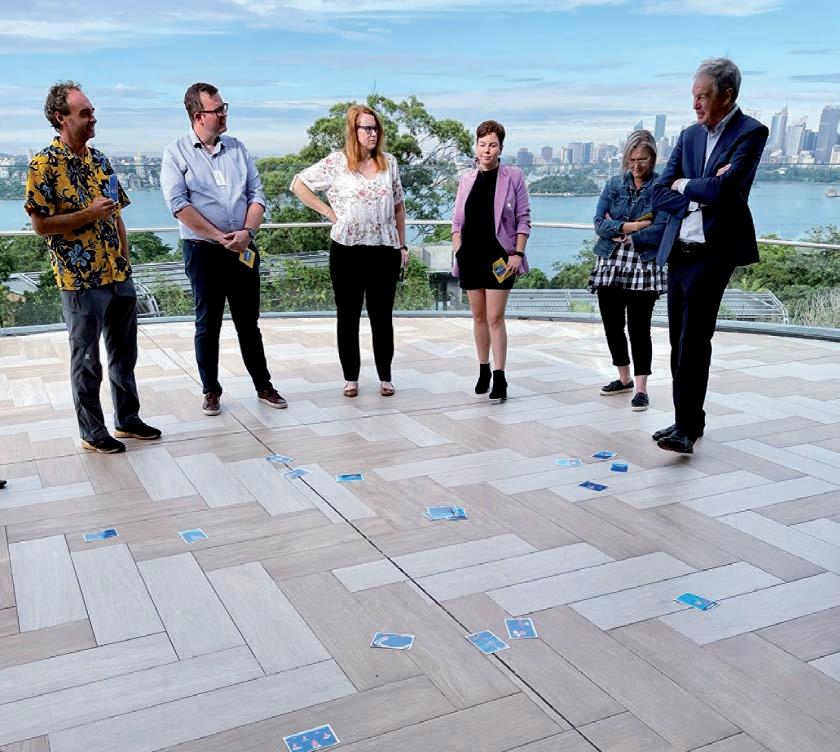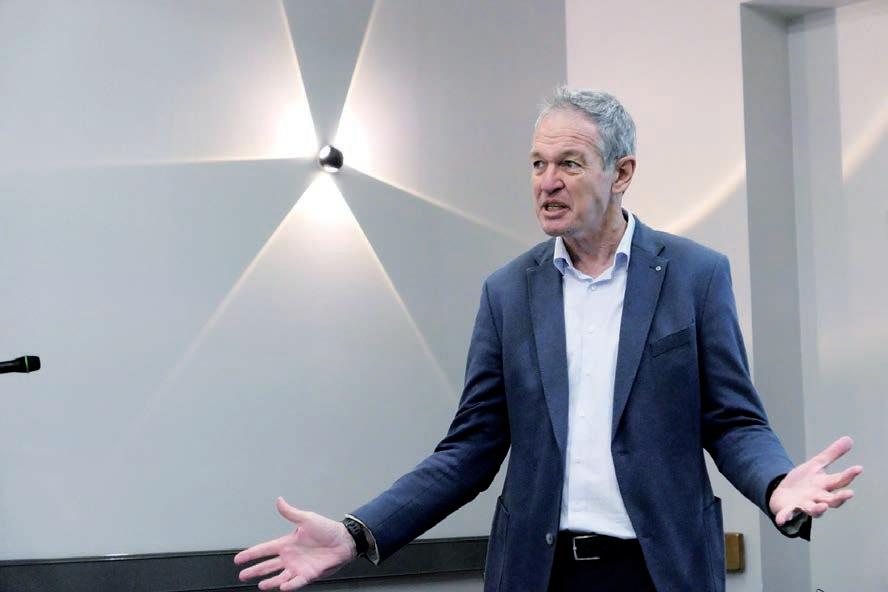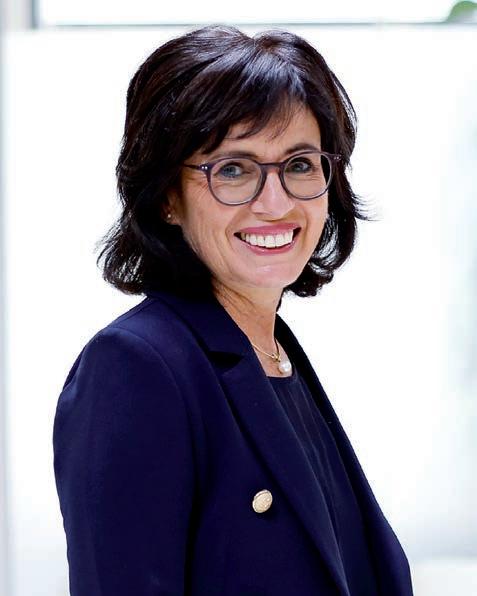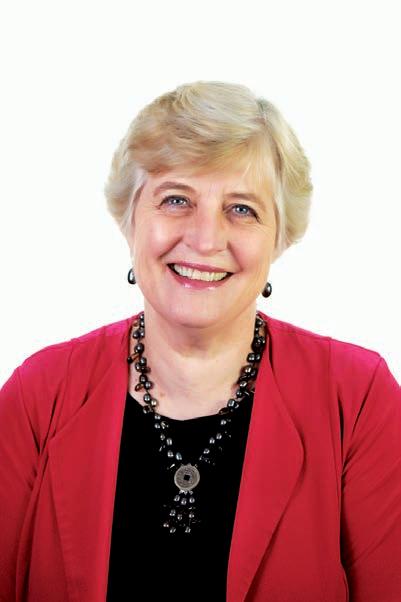
9 minute read
Creating a positive school culture
Leading the creation of a positive school culture
NURTURING THE DEVELOPMENT OF POSITIVE SCHOOL CULTURE IS A KEY ROLE FOR A SCHOOL LEADER, NOW CONSIDERED A VITAL FOCUS TO ENABLE BETTER ORGANISATIONS AND HIGH PERFORMANCE TEAMS.
Lead Fellow Dr Stephen Brown (right) working with Schools Plus Fellowship program winners from the Commonwealth Bank Teaching Awards. Positive, toxic, poor, nurturing – these are all prefixes to the word ‘culture’ that are used on a regular basis to describe organisations ranging from political parties, international sporting teams to government departments and schools.
What is organisational culture, why is it important and how do leaders nurture, stimulate and support the development of positive, productive workplace cultures?
Dr Stephen Brown, Managing Director of the Brown Collective and global leader in the field of school leadership development and formation, has been fascinated by these questions.
“I have been involved in supporting and contributing to the formation of school leaders for decades and such questions are at the heart of the work of any leadership role,” he says.
Dr Brown says that an organisation’s culture is “the patterns or agreements that determine how the business operates” or simply, “how things work (or are done) around here” (McHale, S, 2020, p. 2).
How can leaders build productive, generative, workplaces such as schools? Many school leaders struggle when they try to describe elements that create a positive culture, writes Leah Shafer for the Harvard Graduate School of Education. It’s tricky to define and parsing its components can be challenging. Amid the push for tangible outcomes like higher test scores … it can be tempting to be vague or soft to prioritise, Shafter adds.
Dr Brown suggests that school leaders should be obsessive about organisational culture – it is a hard and necessary part of leadership that enables performance. In their seminal work, The work of leadership, Ronald Heifetz and Donald Laurie (2001) suggest that leaders sometimes frame their work in technical terms such as the production of policy, procedures and increased compliance measures in response to an issue rather than as adaptive or cultural work.
Daniel Coyle in his 2018 book, Culture Code: The Secrets of Highly Successful Groups, indicates that there are three specific culture builders: building psychological safety, sharing vulnerability and establishing a shared purpose. Andrew Fuller in his 2021 occasional paper entitled, Resilient Cultures, Resilient Strategies - The CPR Approach to Wellbeing & Resilience that students, teachers, parents and the community flourish when they feel Connected, Protected and Respected (CPR).
‘You build and change culture one conversation at a time’ – The Brown Collective Managing Director Dr Stephen Brown.
Furthermore, Fuller notes that when such elements of a school’s culture are developed then trust levels increase and the potential for greater collaboration also rises. Siobhan McHale in her book, The Insider’s Guide to Culture Change (2020), describes for leaders four key elements of any workplace culture in the form of the Culture MAPP-mental maps (what people think and feel); patterns (ways of relating); processes (reinforcing decisions) and actions (what people do).

WHAT SKILLS, CAPABILITIES AND DISPOSITIONS DO SCHOOL LEADERS NEED IN ENHANCING THEIR EFFECTIVENESS IN THE NURTURING OF POSITIVE SCHOOL CULTURE?
In working with thousands of emerging and current school leaders across Australia and globally, Dr Brown and The Brown Collective believe that the leadership of the development of positive school culture is broadly about the two Rs – Relationship and Relatedness (after Williams, D, 2005). Leaders need to facilitate, in partnership with key stakeholders’ harmonious relationships and inspire a connection with, or relatedness to, a shared purpose – a sense of belonging, engagement and opportunities to contribute. We by our very nature live in communities and to operate effectively everyone including leaders need to contribute to social cohesion (after O’keeffe, 2011).
“It’s all about the people work. I say to leaders that the best work and the hardest work you will ever do is the people work,” Dr Brown says.
“Get to know your people outrageously, take time to understand their strengths, aspirations and fears. Leadership is an intensely people business. Leaders need to practise and model ostentatious listening and be confident to let silence do the heavy lifting. Simply, the more time spent modelling intense listening will show that a leader values people.”
Culture is about message management, messaging about behaviours, symbols and stories.
Leaders need to also display moral courage – to acknowledge and reward practices, people and activities that contribute to a positive school culture and equally challenge the ones that do not. In supporting the formation of leaders, one of the key areas of development is having difficult, necessary, tricky or professional conversations. The other areas of development leaders want support in are delegation and change leadership, again aspects of cultural leadership.
“A mantra I regularly use is ‘you build and change culture one conversation at a time’,” Dr Brown says.
Leaders need to enable school environments which enhance opportunities for collaboration, curiosity and ‘chit chat’ people engaging with each other to enable exchange of information, ideas and stories (after O’Keeffe). Leaders need to master
PATHWAYS TO SCHOOL LEADERSHIP: LEADING WITH IMPACT PROGRAM
The Pathways to school leadership: leading with impact program is targeted at supporting the ongoing development of current deputy school and college leaders and aspirants to these roles. Every program offering is customised to ensure contextual relevance and alignment with the strategic agenda of the sponsoring school system and schools from which participants are drawn.
‘’The program has provided the opportunity for the participants to interact with a range of exceptional thought leaders and be coached and mentored to develop a range of skills required for the complex task of school leadership,’’ says Ms Prue Horan, Assistant Director, Education Services, Catholic Education Diocese of Wagga Wagga.
“Stephen’s evidence-based approach to contemporary leadership focuses on relationships as the cornerstone and a call to action through leadership challenges.”
the art of storytelling, crafting a narrative that is owned and shared by others.
School leaders should be ‘first class noticers’ of culture, noticing things, looking, scanning inside and outside the schools, asking questions because the establishment, nuancing and maturation of any school’s culture is an ongoing process that will never be complete but paradoxically an aspiration that continually needs to be pursued. Leadership of culture is everyone’s business.
Investing in the development of leaders is a necessary ingredient to the shared ownership and sustainability of a school’s culture. Without the engagement of such groups in schools, experience indicates that any cultural change will reach a cul-de-sac. We know that through our TBC flagship programs such as Leading from the Middle, Leading from Within and Pathways to School Leadership. The individual growth and formation of leaders and the related impact on school culture, leadership density and system contribution is palpable. EM
Learn more: www.thebrowncollective.com.au call: 0427 219 664 or email: admin@thebrowncollective.com.au
The Australian Schools Women’s Leadership Summit
THE AUSTRALIAN SCHOOLS WOMEN’S LEADERSHIP SUMMIT WILL TAKE PLACE AS AN INTERACTIVE ONLINE EVENT ON FRIDAY 3 JUNE 2022, BRINGING TOGETHER INDUSTRY LEADERS WITH A DEEP UNDERSTANDING OF CURRENT CHALLENGES AND OPPORTUNITIES FOR WOMEN LEADERS IN THE EDUCATION SECTOR. THIS SUMMIT WILL PROVIDE OPPORTUNITIES TO BE INSPIRED BY EXPERTS, CONNECT WITH OTHER SCHOOL LEADERS, RECHARGE LEADERSHIP STRATEGIES AS WELL AS PLAN FOR THE FUTURE.
The pandemic has placed extraordinary demands on school leaders, who have been on the front lines dealing with unprecedented disruption for over two years. Recent research conducted by The National Excellence in School Leadership Institute (NESLI) shows that maintaining wellbeing and avoiding burnout is a critical issue for school leaders today. The pandemic has increased the pressure on many women who are already taking on extra caring roles both at work and at home.
In Australia, only 40 per cent of principals are women, compared to 62 per cent of teachers. “We know that while the majority
In Australia, only 40 per cent of principals are women, compared to 62 per cent of teachers. of teaching staff are women, most senior leadership positions in schools are held by men. We believe that nurturing the leadership aspirations and capability of emerging women leaders is an important step towards longterm gender equity, and better outcomes for schools, students and their communities,” says Dr Janet Smith, Director of Programs, NESLI.
Ms Suzi Finkelstein, CEO, NESLI, added: “For women in particular, underrepresentation in leadership roles continues to impede career progression. Women are less likely to identify leadership aspirations, less likely to have female mentors and role models, and less likely to receive recognition and rewards that assist with them in gaining promotion. Women are also less likely to have an uninterrupted career path, which disadvantages them in gaining promotion.”
Drawing together respected educators and thought-leaders, the summit aims to celebrate the role of women as leaders and custodians of their school communities, and provide an accessible, psychologically safe, and focused environment that addresses some of the key challenges faced by women leaders in Australian schools.
The summit provides a platform for women to openly discuss issues around gender equity, leadership and career – an important step in increasing awareness and creating change. Increasing visibility of women leaders in education, providing networking opportunities with other women, and delivering practical leadership strategies and frameworks are all key to improving women’s pathways into leadership.
“Ensuring that female teachers are aware of a pathway to leadership in a school environment, inspiring them to pursue leadership and enabling them to be effective, confident school leaders is critical to the success of Australia’s schools,” Smith says.
“By partnering with Women & Leadership Australia we are able to bring together the latest in women’s leadership expertise and a deep understanding of current challenges and opportunities for leaders in the education sector,” Finkelstein adds.

Dr Janet Smith, Director of Programs.

The full day summit which is a collaboration between the National Excellence in School Leadership Institute (NESLI) and its sister organisation, Women & Leadership Australia, features inspirational keynote presentations, expert workshops, panel discussions, participant breakout sessions and online discussion forums.
Registrations are now open at nesli.org
NESLI supports leadership excellence across the Australian K-12 education system. Established in 2014, NESLI offers responsive and high-quality professional learning programs for school leaders at all levels, including targeted development opportunities for women leaders, and high-profile nation-wide leadership events.
Women & Leadership Australia is a national initiative that supports and develops women leaders at every stage of their journey. They believe that advancing gender equity, especially in leadership, is central to creating a more fair and inclusive society. EM

Suzi Finkelstein, CEO.
Learn more: www.nesli.org
For women in particular, underrepresentation in leadership roles continues to impede career progression.
LIST OF SPEAKERS

Tanya Plibersek
MP Shadow Minister for Education, Shadow Minister for Women, Federal Member for Sydney
Jelena Dokic
Former World #4 Tennis Player; Olympian; TV Commentator & Expert Analyst, Channel 9; Bestselling Author; Advocate
Dr Briony Scott
Principal, Wenona School
Dr Jessa Rogers
First Nations Senior Research Fellow, Queensland University of Technology; Managing Director, Baayi Consulting
Kristen Douglas
National Manager & Head, headspace Schools
Liv Pennie
CEO & Co-Founder, BECOME Education
Ashley Fell
Director of Communications, McCrindle; Social Researcher; Author; TEDx Speaker
Marisa Matthys
Principal, St Mary’s School Greensborough
Dr Cynthia Briggs
Lecturer Indigenous Knowledge, Gnibi College of Indigenous Australian Peoples, Southern Cross University
Susan French PSM
Principal in Residence, Bush Fire Strategy Relief, Office of the Deputy Secretary School Performance, NSW Department of Education
Dr Miriam-Rose Ungunmerr Baumann AM
Aboriginal Elder; Renowned Artist; Activist; Writer; Public Speaker










